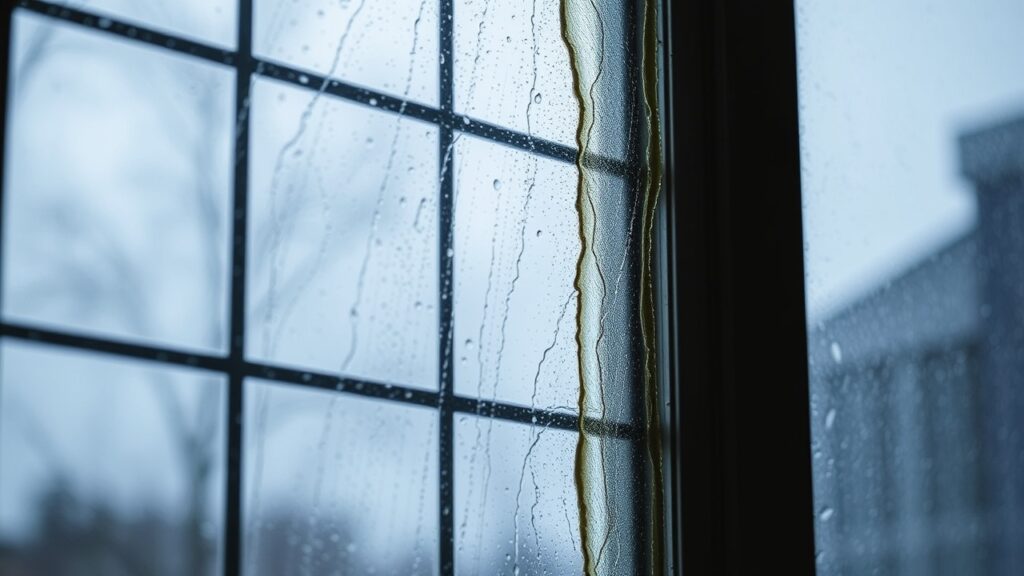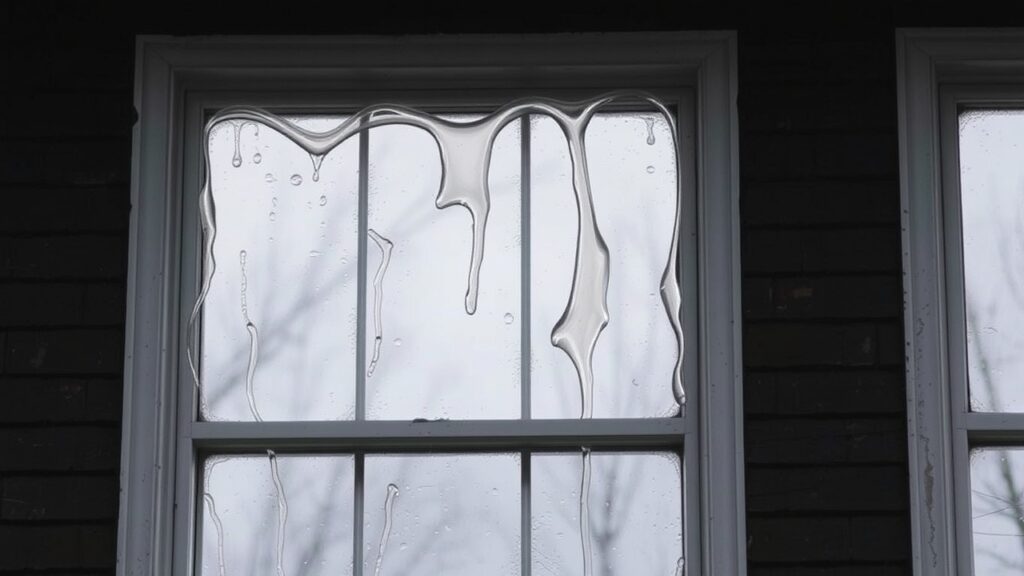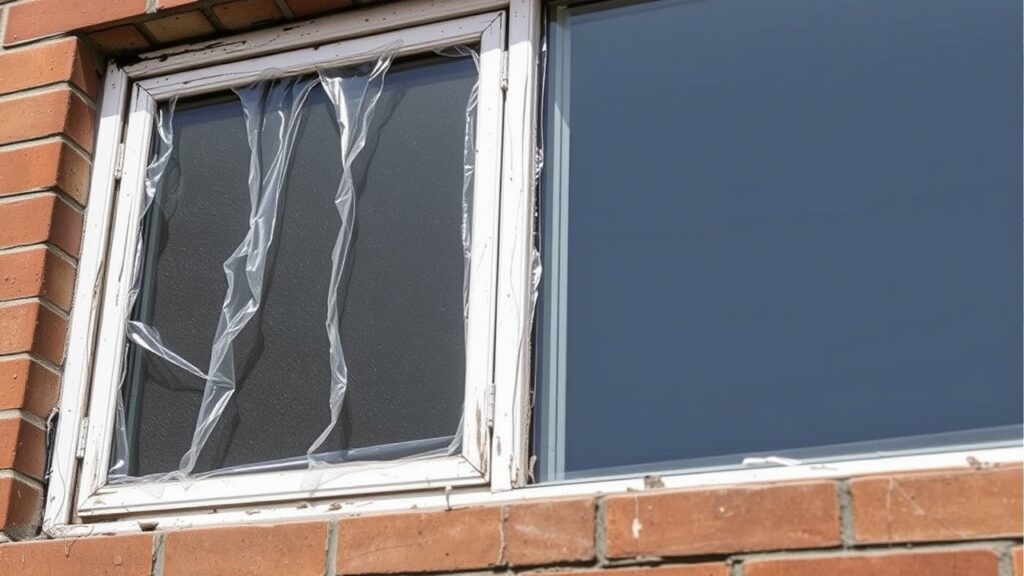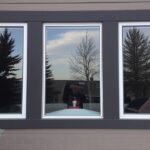For homeowners, leaking windows during rainstorms can pose a significant challenge. There are several common causes of leaking windows, including old or damaged window seals, cracked or deteriorating window frames, and poor installation. When it rains, water can seep through these vulnerabilities and into your home, causing damage to walls, floors, and furniture.
In addition to the inconvenience of dealing with a leaky window, water damage can also lead to mould and mildew growth, which can pose health risks to you and your family. It’s important to understand the causes of leaking windows so that you can take the necessary steps to address the issue and prevent further damage to your home. One of the most common causes of leaking windows is old or damaged window seals.
Over time, the seals around your windows can become worn out or cracked, allowing water to seep through and into your home. Similarly, if your window frames are cracked or deteriorating, they can also allow water to enter your home during a rainstorm. Poor installation is another common cause of leaking windows.
If your windows were not properly installed, there may be gaps or other vulnerabilities that allow water to penetrate your home. Understanding these causes can help you identify the source of the problem and take the necessary steps to address it.
Key Takeaways
- Leaking windows during rainstorms can cause damage to your home and should be addressed promptly.
- Window replacement can prevent leaks and improve weather resistance in your home.
- Choosing the right windows, such as energy-efficient ones, can further protect your home from leaks.
- Professional installation is crucial for ensuring a leak-free window replacement.
- Regular maintenance of your new windows is important for long-term protection against leaks.
The Importance of Addressing Leaking Windows for Homeowners

Addressing leaking windows is crucial for homeowners for several reasons. First and foremost, leaking windows can cause significant damage to your home. Water that seeps through a leaky window can damage walls, floors, and furniture, leading to costly repairs and replacements.
In addition to the immediate damage caused by leaking windows, water intrusion can also lead to mould and mildew growth, which can pose health risks to you and your family. By addressing leaking windows, you can prevent these issues and protect the value of your home. Furthermore, addressing leaking windows can also help improve the energy efficiency of your home.
When water enters your home through a leaky window, it can also bring in cold air during the winter and hot air during the summer. This can lead to increased energy costs as your heating and cooling systems work harder to maintain a comfortable temperature. By addressing leaking windows, you can improve the overall energy efficiency of your home and reduce your utility bills.
Additionally, addressing leaking windows can also improve the comfort of your home by reducing drafts and maintaining a consistent temperature throughout your living spaces. Overall, addressing leaking windows is important for protecting your home from damage, improving energy efficiency, and maintaining a comfortable living environment.
How Window Replacement Can Prevent Leaks During Rainy Weather

One of the most effective ways to prevent leaks during rainy weather is by replacing your old or damaged windows. Window replacement can help address the common causes of leaking windows, such as old or damaged seals, cracked or deteriorating frames, and poor installation. By installing new, high-quality windows, you can create a tight seal that prevents water from entering your home during rainstorms.
This can help protect your home from water damage and reduce the risk of mould and mildew growth. In addition to preventing leaks, window replacement can also improve the overall energy efficiency of your home. New windows are designed with advanced technology that helps to insulate your home and prevent air leakage.
This can help reduce your energy costs by keeping your home at a consistent temperature throughout the year. Furthermore, installing new windows can improve your home’s curb appeal and boost its value. By investing in window replacement, you can not only prevent leaks during rainy weather but also improve the overall comfort and value of your home.
Choosing the Right Windows for Improved Weather Resistance

When it comes to preventing leaks during rainy weather, choosing the right windows is crucial. There are several factors to consider when selecting new windows for improved weather resistance. First and foremost, it’s important to choose high-quality windows that are designed to withstand harsh weather conditions.
Look for windows that are made from durable materials and have strong seals to prevent water intrusion. Additionally, consider the design and construction of the windows, as well as any additional features that can enhance their weather resistance. Another important factor to consider when choosing new windows is their energy efficiency.
Look for windows that are ENERGY STAR certified, as these have been independently tested and verified to meet strict energy efficiency standards. ENERGY STAR certified windows are designed to provide superior insulation and prevent air leakage, which can help improve the overall comfort and energy efficiency of your home. Additionally, consider any additional features that can enhance the weather resistance of your new windows, such as double- or triple-pane glass, low-emissivity coatings, and gas fills.
By choosing the right windows for improved weather resistance, you can effectively prevent leaks during rainy weather and protect your home from water damage.
The Benefits of Upgrading to Energy-Efficient Windows
In addition to preventing leaks during rainy weather, upgrading to energy-efficient windows offers several benefits for homeowners. Energy-efficient windows are designed to provide superior insulation and prevent air leakage, which can help reduce your energy costs and improve the overall comfort of your home. By keeping your home at a consistent temperature throughout the year, energy-efficient windows can help reduce the strain on your heating and cooling systems, leading to lower utility bills.
Furthermore, upgrading to energy-efficient windows can also enhance the value of your home. Potential buyers are often attracted to homes with energy-efficient features, as they offer long-term cost savings and environmental benefits. By investing in energy-efficient windows, you can increase the overall value of your home and make it more attractive to potential buyers in the future.
Additionally, energy-efficient windows can enhance your home’s curb appeal and improve its overall aesthetic.
Professional Installation: Ensuring a Leak-Free Window Replacement
Preventing Leaks and Water Damage
Professional installers can identify any potential vulnerabilities in your window openings and take the necessary steps to address them before installing new windows. This includes ensuring that the window is properly sealed and that all flashing and weatherproofing is in place.
Proper Alignment and Smooth Operation
In addition to preventing leaks, professional installation also ensures that your new windows are properly aligned and operate smoothly. This can help extend the lifespan of your new windows and prevent issues such as air leakage and drafts.
Long-Term Protection and Maintenance
Furthermore, professional installers can also provide valuable advice on maintaining your new windows for long-term protection against leaks. Following their expert guidance will provide you with peace of mind, ensuring your new windows continue to perform well for years to come.
Maintaining Your New Windows for Long-Term Protection Against Leaks
Once you have invested in new windows for improved weather resistance, it’s important to maintain them properly to ensure long-term protection against leaks. Regular maintenance can help extend the lifespan of your new windows and prevent issues such as air leakage and water intrusion. Here are some tips for maintaining your new windows: – Clean your windows regularly to remove dirt and debris that can affect their performance.
– Inspect the seals around your windows for signs of wear or damage, and replace them if necessary.
– Check for any cracks or gaps in your window frames and address them promptly.
– Keep an eye out for any signs of water intrusion around your windows, such as water stains or mould growth.
– Consider applying a protective coating to your new windows to enhance their weather resistance.
By following these maintenance tips, you can ensure that your new windows continue to provide long-term protection against leaks and other issues related to rainy weather. In conclusion, leaking windows during rainstorms can be a major headache for homeowners, causing damage to their homes and posing health risks due to mould growth. Understanding the causes of leaking windows is crucial for identifying the source of the problem and taking necessary steps to address it.
Window replacement is an effective solution for preventing leaks during rainy weather, as it addresses common causes such as old or damaged seals, cracked frames, and poor installation. Choosing the right windows for improved weather resistance is essential for preventing leaks, as high-quality, energy-efficient windows can provide superior insulation and prevent air leakage. Professional installation is crucial for ensuring a leak-free window replacement, as experienced installers have the knowledge and expertise to properly install new windows and create a tight seal that prevents water intrusion.
Finally, maintaining new windows is important for long-term protection against leaks, as regular maintenance can help extend their lifespan and prevent issues such as air leakage and water intrusion. By understanding the causes of leaking windows during rainstorms and taking necessary steps such as window replacement and maintenance, homeowners can protect their homes from water damage and improve their overall comfort and energy efficiency.
FAQs
What are the common causes of leaking windows when it rains?
Leaking windows when it rains can be caused by various factors such as deteriorated caulking, damaged window seals, improper installation, or old and worn-out windows.
How does window replacement help in preventing leaking windows when it rains?
Window replacement helps in preventing leaking windows when it rains by installing new, properly sealed windows that are designed to withstand the elements and provide a tight seal against water infiltration.
What are the benefits of replacing leaking windows with new ones?
Replacing leaking windows with new ones can help improve energy efficiency, enhance the overall appearance of the home, reduce outside noise, and prevent water damage and potential mould growth caused by leaking doors.
How can I determine if my windows need to be replaced due to leaking when it rains?
You can determine if your windows need to be replaced due to leaking when it rains by conducting a visual inspection for signs of water infiltration, such as water stains, peeling paint, or visible gaps around the window frame. Additionally, if you feel drafts or notice an increase in energy bills, it may be a sign that your windows need replacement.
What are some important factors to consider when choosing new windows to prevent leaking when it rains?
When choosing new windows to prevent leaking when it rains, it’s important to consider factors such as the quality of the window materials, the type of window frame, the efficiency of the window seals, and the professional installation by experienced contractors.


